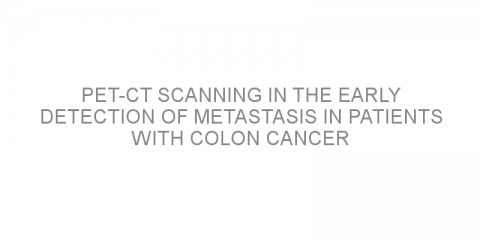In a nutshell This study investigated the positive effect of PET-CT (an imaging technique) evaluation after surgery in stage 3 colon cancer. Researchers suggested that early follow-up with PET-CT leads to early detection of metastasis (spread to other parts of the body) in patients with stage 3 colon cancer. Some background Stage 3 colon cancer...
Read MoreConfined or spread disease-Confined only to the colon, rectum or appendix Posts on Medivizor
Adding mFOLFOX6 to the standard treatment for rectal cancer increases cancer response and survival
In a nutshell This study investigated whether adding mFOLFOX6 (modified; folinic acid, fluorouracil, and oxaliplatin) chemotherapy after standard chemotherapy and radiotherapy (CRT) and delaying surgery improves cancer response and survival in rectal cancer. Researchers suggest that this treatment increases disease-free survival (DFS;...
Read MoreDoes chemotherapy after surgery improve survival in older patients with colon cancer?
In a nutshell This study investigated the use of chemotherapy after surgery in elderly patients with stage 2 and 3 colon cancer. Researchers suggested that chemotherapy after surgery improves outcomes in patients with stage 3 colon cancer. Some background Life expectancy in the Western countries has increased. Colorectal cancer is diagnosed most...
Read MoreIs targeted chemotherapy for stage II/III rectal cancer before surgery effective?
In a nutshell This study examined the effect of pre-surgical chemotherapy without radiotherapy in stage II/III rectal cancer. The study showed that combined targeted chemotherapy was effective in these patients. Some background Rectal cancer is a cancer of the end part of the digestive system. In stage II and III, the cancer has begun to...
Read MoreFollow-up of patients with colorectal cancer: A review
In a nutshell This study is the second update of a review focusing on the effects of an intense follow-up for patients with colorectal cancer after treatment. Some background Patients with colorectal cancer who underwent surgery or adjuvant therapy (treatment following surgery) are followed for several years. However, multiple appointments and...
Read MoreOptimal waiting time to surgery after chemotherapy and radiation therapy in rectal cancer
In a nutshell This study investigated the optimal waiting time between chemotherapy and radiation therapy and surgery in rectal cancer patients. Researchers suggested that a prolonged waiting time improves response to the treatment. Some background Chemotherapy and radiation therapy (CRT) is the recommended treatment before rectal surgery....
Read MoreDepression and capacity to manage problems associated with recovery in patients with colorectal cancer
In a nutshell This study investigated the predictors of recovery of patients with colorectal cancer two years after surgery. Researchers reported that depression and capacity to manage problems before surgery are associated with health and well-being in recovery two years after surgery. Some background The support a cancer patients receives...
Read MoreCan classifying your cancer help predict whether it will spread to the lymph nodes?
In a nutshell This study looked at whether classifying a person’s cancer based on how it has started to grow into the local tissue can predict spread to lymph nodes (metastases). Some background A common treatment option for patients with T1 colorectal cancer (cancer is beginning to spread into the muscle layer) which has not...
Read MoreMicrosurgery for rectal cancer: how successful is transanal endoscopic microsurgery?
In a nutshell The authors examined the outcomes of rectal cancer patients after transanal endoscopic microsurgery (TEM). Some background Cancers are often described in terms of grades and stages. The T grades of rectal cancer describe how far the cancer has spread through the layers of the rectum. A T1 grade indicates that the cancer has grown...
Read MoreMargin call: Predicting margin involvement following surgical removal of rectal tumors
In a nutshell This study investigated risk factors for positive circumferential resection margins (CRM) in patients with cancer in the middle or lower rectum. Some background Locally advanced rectal cancer indicates that the cancer has spread beyond the lining of the rectum or has spread to the nearby lymph nodes. The main treatment for patients...
Read MoreDoes pre-surgery chemoradiotherapy reduce physical fitness and leave patients at risk of surgical complications?
In a nutshell This study investigated the impact of pre-surgery chemoradiotherapy on physical fitness for patients with rectal cancer. They also explored whether physical fitness affects recovery from surgery. Some background Locally advanced rectal cancer indicates that the cancer has spread beyond the lining of the rectum or has spread to the...
Read MorePreoporative Bevacizumab, Radiation Therapy, and XELOX Chemotherapy for Locally Advanced Nonmetastatic Rectal Cancer in China
In a nutshell This trial, recruiting in China only, aims to evaluate whether adding bevacizumab (Avastin) to radiation and chemotherapy regimens is a more effective treatment for locally advanced rectal cancer (cancer that has started to infiltrate surrounding tissues). The main outcome being investigated is tumor regression (shrinkage) following the...
Read More












